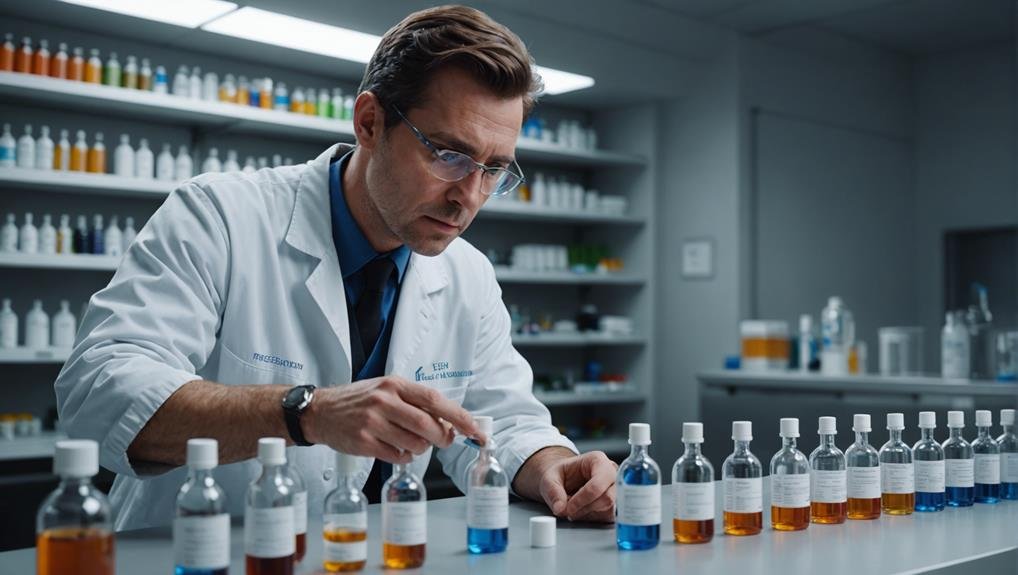Fda: Safeguarding Health With Stringent Regulations
The FDA plays a crucial role in protecting public health by enforcing strict regulations to guarantee the safety and efficacy of pharmaceutical products. Through rigorous evaluation processes and monitoring of clinical trials, the FDA approves only products that meet stringent quality and safety standards. By exercising its enforcement powers, the FDA maintains compliance in the industry, safeguarding consumers from potential risks. FDA approvals not only impact revenue and market dynamics but also uphold product safety standards. Learn more about how the FDA's stringent regulations contribute to safeguarding public health and shaping the pharmaceutical industry.
Key Takeaways
- FDA ensures product safety through rigorous regulatory oversight.
- FDA conducts inspections to verify compliance with standards.
- FDA approves products only after confirming safety and efficacy.
- FDA has the authority to recall products for safety reasons.
- FDA monitors and takes action on safety concerns for medical products.
FDA Regulation of New Drugs
With the responsibility to guarantee the safety and efficacy of pharmaceutical products, the Food and Drug Administration meticulously regulates the development of new drugs through a thorough approval process. Drug development involves multiple phases of clinical trials, where pharmaceutical companies must demonstrate the safety and effectiveness of their products.
Clinical trials are carefully designed studies that assess the impact of new drugs on human participants, following stringent protocols to ensure data accuracy and patient safety. The FDA closely monitors these trials to evaluate the potential risks and benefits of the new medications. Through this rigorous process, the FDA plays an essential role in safeguarding public health by making sure that only safe and effective drugs reach the market.
FDA Product Approval Process
The FDA meticulously evaluates and approves products through a stringent regulatory process to confirm their safety and effectiveness before they can be marketed in the United States. This process involves extensive clinical trials and compliance with regulatory requirements to verify the product meets the necessary standards. Companies must conduct four phases of clinical trials as part of the approval process. Below is a table highlighting key aspects of the FDA product approval process:
| Aspect | Description | Importance |
|---|---|---|
| Clinical Trials | Essential for testing product efficacy | Validates product safety and effectiveness |
| Regulatory Requirements | Must be met for approval | Ensures compliance with FDA standards |
| Approval Process | Involves rigorous evaluation | Confirms product quality and efficacy |
Through this meticulous process, the FDA upholds its commitment to safeguarding public health by ensuring only safe and effective products reach the market.
FDA Enforcement Powers and Actions
The regulatory oversight provided by the FDA extends to enforcing its powers and taking actions to maintain the safety and efficacy of products in the market. FDA enforcement actions are essential in upholding compliance standards and ensuring that regulated products meet stringent regulatory requirements.
Through its regulatory oversight, the FDA works towards risk mitigation by monitoring and inspecting production facilities, approving products before market entry, and recalling items if safety concerns arise. The FDA conducts inspections at various facilities, including those involved in animal testing and clinical trials, as well as at points of importation to safeguard public health.
Impact of FDA Approvals on Industry
FDA approvals have a significant impact on the commercial landscape for pharmaceutical companies looking to introduce new products to the market. These approvals not only influence revenue growth but also shape market dynamics and regulatory standards. Below is a table highlighting the key aspects of how FDA approvals impact the industry:
| Industry Impact | Revenue Growth | Market Influence |
|---|---|---|
| Guarantees product quality | Drives sales of approved drugs | Sets benchmarks for competitors |
| Enhances credibility | Expands product portfolio | Influences investor confidence |
| Facilitates market access | Boosts market share | Shapes pricing strategies |
This table demonstrates the multifaceted impact FDA approvals have on the pharmaceutical industry, illustrating their pivotal role in driving growth and shaping market behavior.
FDA's Role in Ensuring Product Safety
Playing a pivotal role in safeguarding public health, the Food and Drug Administration guarantees the safety of regulated products through stringent regulatory oversight. The FDA's mandate includes inspecting and reviewing production facilities, approving products before they can be sold in the U.S., and having the authority to recall products for safety reasons.
By monitoring the safe consumption of medical products, food, and tobacco items, the FDA safeguards public health. With a fiscal 2020 budget of approximately $5.9 billion, the FDA conducts inspections at various facilities, including those for animal testing and clinical trials, as well as at the border for imported regulated products.
In cases of safety concerns like undeclared ingredients or contamination, the FDA takes necessary actions to protect public health.
Conclusion
In conclusion, the FDA's stringent regulations serve as a beacon of light in the murky waters of consumer safety. By meticulously overseeing the approval process of new drugs and enforcing compliance measures, the FDA plays a crucial role in protecting public health.
While some may view the FDA as a bureaucratic hurdle, its unwavering commitment to upholding standards guarantees that only safe and effective products reach the market. In this intricate dance of regulation and innovation, the FDA remains a steadfast guardian of public well-being.







